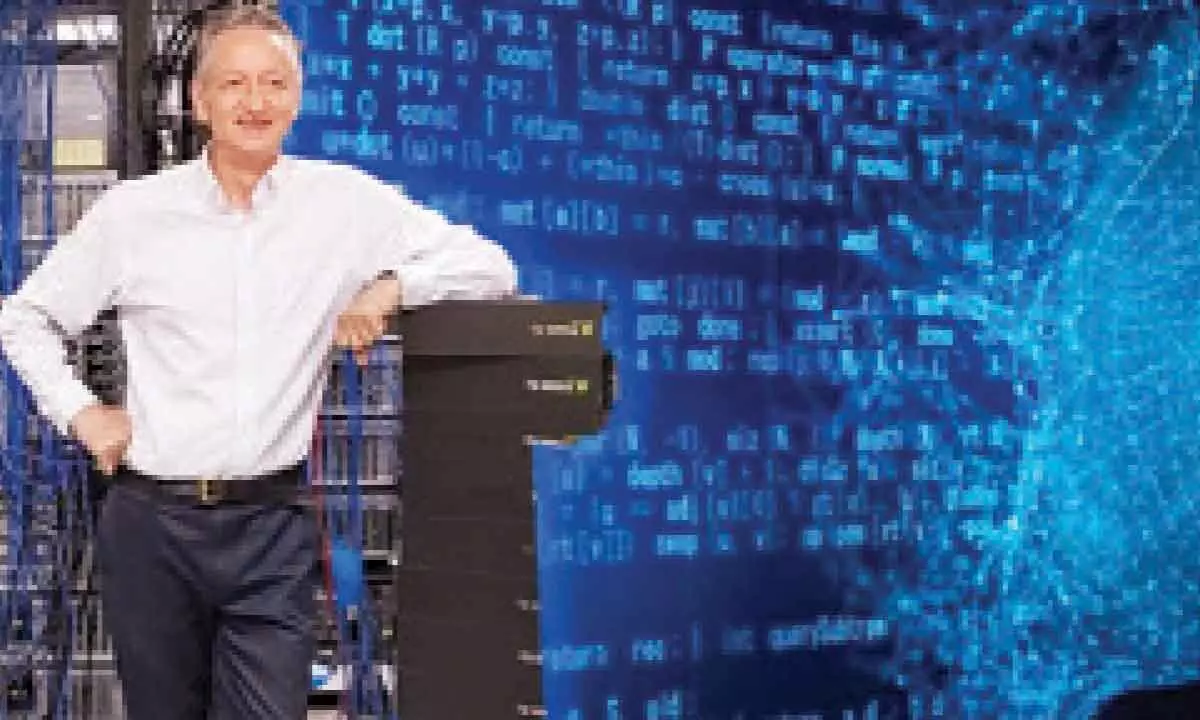Live
- Why Rake Up The Issue After 44 Years? SC upholds ‘secular, socialist’ in Preamble
- Kia hits milestone of 1 lakh CKD exports from Anantapur plant
- Maha tussle delays formation of new govt
- Telangana spurns Adani benevolence
- Samajwadi MP among 400 charged for Sambhal violence
- Sansad Sangram Begins: Oppn stalls Parl over Adani issue, Manipur
- Stern action against social media abusers, warns minister
- Dr Karri Rama Reddy sets record by securing 50 degrees
- Mohini Bhasmasura dance ballet captivates audience
- Film director Ram Gopal Varma evades police questioning
Just In
New York: ‘Godfather of artificial intelligence' warns of dangers as he quits Google


AI chatbots will soon be more intelligent than us, says Hinton
New York : A man widely seen as the godfather of artificial intelligence (AI) has quit his job, warning about the growing dangers from developments in the field.
Geoffrey Hinton, 75, announced his resignation from Google in a statement to the New York Times, saying he now regretted his work.
He told the BBC some of the dangers of AI chatbots were "quite scary".
"Right now, they're not more intelligent than us, as far as I can tell. But I think they soon may be."
Dr Hinton also accepted that his age had played into his decision to leave the tech giant, telling the BBC: "I'm 75, so it's time to retire."
Dr Hinton's pioneering research on neural networks and deep learning has paved the way for current AI systems like ChatGPT.
In artificial intelligence, neural networks are systems that are similar to the human brain in the way they learn and process information. They enable AIs to learn from experience, as a person would. This is called deep learning.
The British-Canadian cognitive psychologist and computer scientist told the BBC that chatbots could soon overtake the level of information that a human brain holds.
"Right now, what we're seeing is things like GPT-4 eclipses a person in the amount of general knowledge it has and it eclipses them by a long way. In terms of reasoning, it's not as good, but it does already do simple reasoning," he said. "And given the rate of progress, we expect things to get better quite fast. So we need to worry about that."
In the New York Times article, Dr Hinton referred to "bad actors" who would try to use AI for "bad things". When asked by the BBC to elaborate on this, he replied: "This is just a kind of worst-case scenario, kind of a nightmare scenario.
"You can imagine, for example, some bad actor like (Russian President Vladimir) Putin decided to give robots the ability to create their own sub-goals."
The scientist warned that this eventually might "create sub-goals like 'I need to get more power'".
He added: "I've come to the conclusion that the kind of intelligence we're developing is very different from the intelligence we have.
“We’re biological systems and these are digital systems. And the big difference is that with digital systems, you have many copies of the same set of weights, the same model of the world.
“And all these copies can learn separately but share their knowledge instantly. So it’s as if you had 10,000 people and whenever one person learnt something, everybody automatically knew it. And that’s how these chatbots can know so much more than any one person.”
Matt Clifford, the chairman of the UK’s Advanced Research and Invention Agency, speaking in a personal capacity, told the BBC that Dr Hinton’s announcement “underlines the rate at which AI capabilities are accelerating”.
“There’s an enormous upside from this technology, but it’s essential that the world invests heavily and urgently in AI safety and control,” he said.
Dr Hinton joins a growing number of experts who have expressed concerns about AI - both the speed at which it is developing and the direction in which it is going.
‘We need to take a step back’
In March, an open letter - co-signed by dozens of people in the AI field, including the tech billionaire Elon Musk - called for a pause on all developments more advanced than the current version of AI chatbot ChatGPT so robust safety measures could be designed and implemented. Yoshua Bengio, another so-called godfather of AI, who along with Dr Hinton and Yann LeCun won the 2018 Turing Award for their work on deep learning, also signed the letter.
But Dr Hinton told the BBC that “in the shorter term” he thought AI would deliver many more benefits than risks, “so I don’t think we should stop developing this stuff,” he added.
He also said that international competition would mean that a pause would be difficult.

© 2024 Hyderabad Media House Limited/The Hans India. All rights reserved. Powered by hocalwire.com






